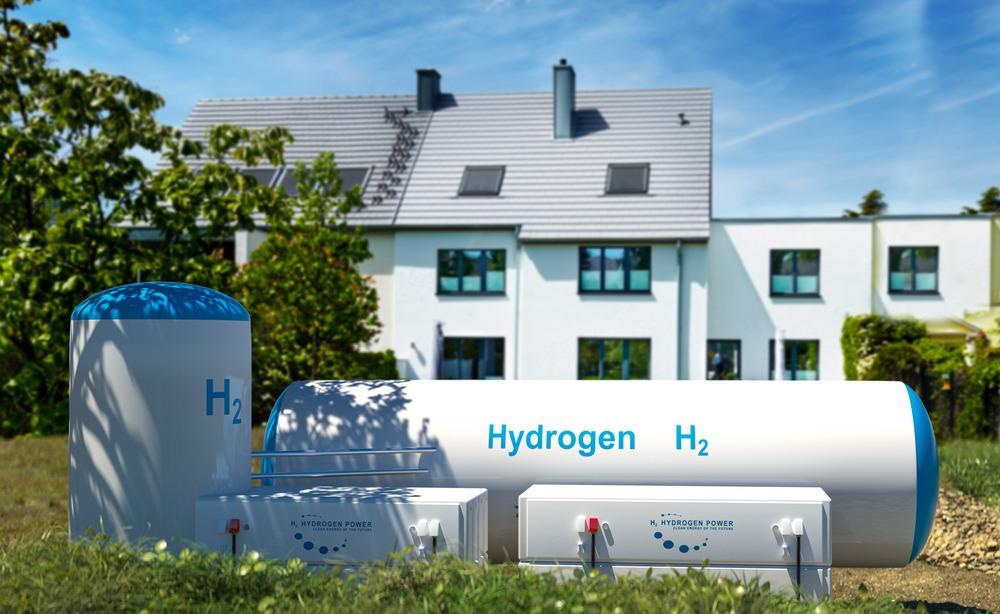With around 85% of homes in the UK reliant on gas-fired central heating, the energy used to heat our homes and workspaces accounts for around 17% of the UK’s total carbon emissions. To meet net-zero emissions by 2050, the UK needs to find alternative means of keeping homes warm. Hydrogen could fit the bill, but the UK would have to pioneer its use.

Image Credit: Alexander Kirch/Shutterstock.com
Gateshead Show Home
A pair of purpose-built homes in Gateshead in the northeast of England is showcasing the benefits of hydrogen gas for heating our homes. Initially running on tanks of hydrogen rather than the grid, the homes will demonstrate how hydrogen can be used for heating and cooking. This pilot could lead to hydrogen neighborhoods and towns by the end of the decade.
Hydrogen use is considered controversial as critics claim it can be dangerous and difficult to generate. To meet net-zero emissions, low-carbon heating should rely on a wide range of technology, including heat pumps, electrification, and geothermal energy from abandoned mines.
Consequently, hydrogen was not in serious contention, but it could play a key role in safely and cleanly heating our homes. Hydrogen and natural gas have a similar Wobbe index, a measure of the amount of heat energy within a given volume of gas. Although hydrogen has a lower calorific value, it has a greater density so the same volumes of each gas will give about the same amount of heat.
How Hydrogen Can be Used in Homes
The key question is how to get hydrogen gas into homes. The Hy4Heat program, which brings together energy firms, appliance manufacturers, and research institutions, suggests hydrogen-ready boilers and switching street by street, town by town, much like the transition to natural gas in the 1960s and 70s.
But the current infrastructure may not be up to standard. Current domestic boilers need to be replaced with hydrogen-ready equivalents which can initially be used with natural gas and then hydrogen following a simple maintenance visit such as that developed by major boiler manufacturer Worcester Bosch.
It was not a simple journey as the company had to consider if the gas could be safely burned in a domestic boiler and overcome several engineering problems to create its hydrogen-ready design.
Factors to overcome included issues with flashback, caused by a faster flame speed and shorter flame height, which although safe, made for a noisy boiler. Another challenge concerned monitoring and controlling the flame; normal boilers use an electric current generated by carbon molecules to sense the flame, but this is not achievable with hydrogen gas.
Real-World Testing of Hydrogen Gas in Homes
There is no reason why the existing gas network cannot be used to bring gas into people’s homes. However, the age, integrity, and condition of the National Grid need to be considered. The FutureGrid study, which includes gas distribution companies, research groups, and others, has been exploring the possibility of converting the grid to hydrogen.
Hydrogen can make metal brittle so the current network may not be satisfactory. Fortunately, the gas industry has been updating and replacing its metal pipes with polyethylene ones, and these do not react with hydrogen. They aim to have exchanged 90% of the network by 2030.
The switch from natural gas to hydrogen will be a slow process, beginning with blending hydrogen into the current gas network until it reaches 100% hydrogen.
A mini-offline system was constructed to test different blends of natural gas and hydrogen to understand the impact it could have before an offline distribution network was constructed to a row of purpose-built demonstration homes – the Gateshead trial.
The Future of Heating our Homes
Other options include electrification and the use of heat pumps to extract heat from the air to heat our homes or the use of district heating facilities. Although both could significantly lower heating’s carbon footprint, they require extensive work to roll out on a national scale.
There are still some questions to be answered and challenges to overcome, but there is growing confidence and momentum in using hydrogen as a fuel for heating homes. The key to including hydrogen in the mix is changing people’s attitudes towards the gas and how it is generated, but it is likely that hydrogen will make a key contribution towards a decarbonized future.
References and Further Reading
Excell, J. (2021) Engineering the hydrogen home, The Engineer - https://www.theengineer.co.uk/low-carbon-engineering-hydrogen-home/. Accessed 21 June 2021.
Ambrose, J. (2021) First UK homes with hydrogen boilers and hobs to be built by April, The Guardian - https://www.theguardian.com/business/2021/feb/16/first-uk-homes-with-hydrogen-boilers-and-hobs-to-be-built-by-april. Accessed 21 June 2021.
Clark, S. (2020) Is hydrogen the solution to net-zero home heating? The Guardian - https://www.theguardian.com/science/2020/mar/21/is-hydrogen-the-solution-to-net-zero-home-heating. Accessed 21 June 2021.
Disclaimer: The views expressed here are those of the author expressed in their private capacity and do not necessarily represent the views of AZoM.com Limited T/A AZoNetwork the owner and operator of this website. This disclaimer forms part of the Terms and conditions of use of this website.